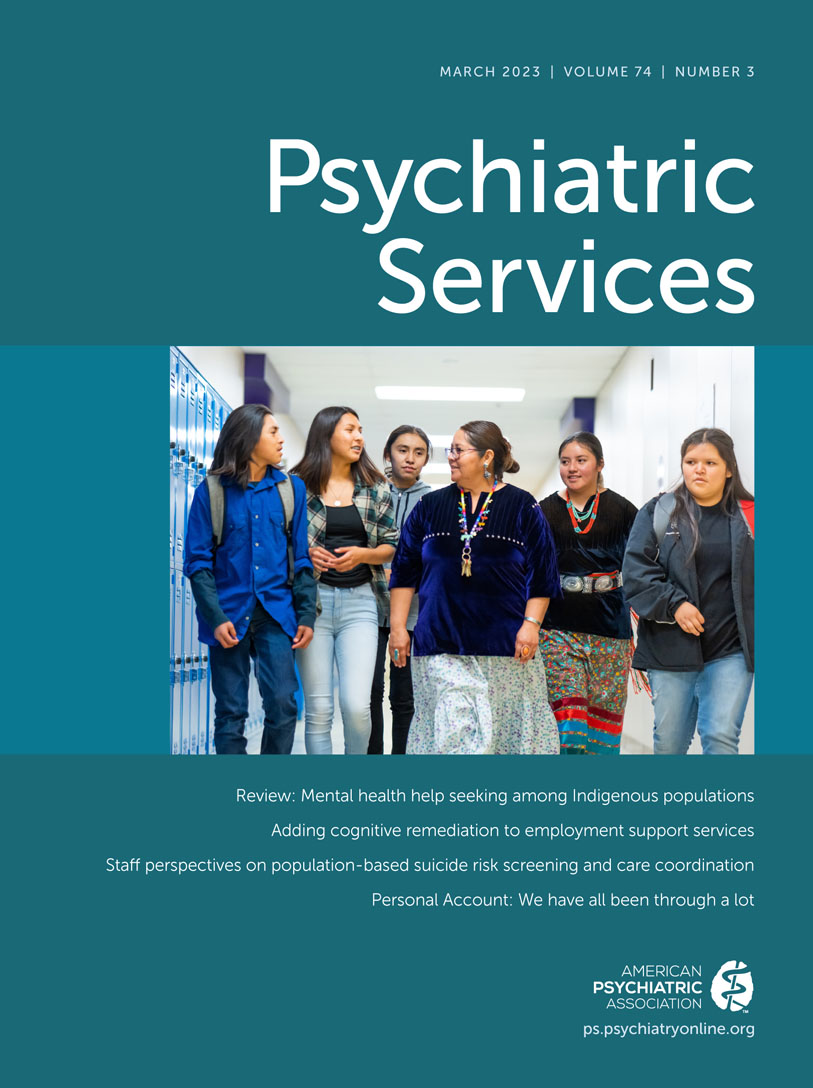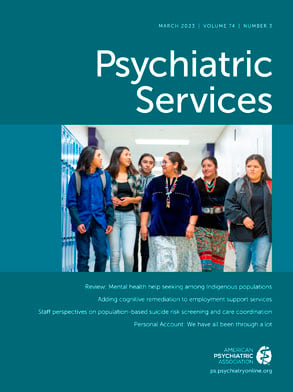In the wake of uprisings against police brutality and anti-Black racism in the summer of 2020 in the United States, an urgent need has emerged to address anti-Black racism in all aspects of society, including biomedical research. Institutional review boards (IRBs) and research institutions such as the National Institutes of Health require Data Safety and Monitoring Plans for human subjects research. According to the National Institute of Mental Health (
1), monitoring in clinical research refers to
1) the clinical/safety monitoring of individual participants; 2) the monitoring of safety data...; 3) monitoring of study documents and study data...; and 4) review of study data to [ensure] data accuracy and consistency from collection through storage, retrieval, analysis, and reporting.
Monitoring plans for human subjects research in mental health require explicit research safety protocols that describe the risks associated with study participation and researchers’ plans for minimizing these risks, including how they will handle instances in which research participants may express suicidal ideation or have another type of mental health crisis (
2). These research safety protocols may vary, with the level of monitoring commensurate with the level of risk associated with the study and the study population’s characteristics (
2). Although general principles for these protocols exist, the details vary widely, with Schatten et al. (
3) noting, “As there are no standard guidelines for identifying and managing suicide risk in studies, individual researchers and their ethics committees typically make these decisions idiosyncratically.”
For mental health emergencies, research safety protocols commonly culminate in the use of crisis intervention services, typically involving law enforcement (
4). As society critically examines the role of law enforcement in mental health crises, researchers also must evaluate the routine inclusion of law enforcement in these protocols.
The Crisis of Mental Health Emergency Responses
The use of law enforcement in mental health crisis responses creates a structural risk environment for people with mental illness that increases their risk for traumatization, injury, arrest, incarceration, and death (
5). Studies have revealed that individuals with mental illness are arrested at a higher rate, and are more than seven times more likely to be killed as a result of police intervention, than those without mental illness (
6).
These adverse outcomes are increased during law enforcement–based welfare checks of Black, Indigenous, and people of color (BIPOC), particularly Black and African American individuals (
6,
7). Police brutality against Black and African American communities is an urgent national and public health crisis and results in a negative psychological impact on Black and African American individuals and collective traumas to Black and African American communities (
7). Black and African American individuals are at an especially elevated risk because they are 2.6 times more likely to be killed during interactions with police than are White individuals (
6). Non-Black Latinx individuals with a mental illness are almost three times more likely to have a fatal encounter with police than are Latinx individuals without mental illness (
6). Non–law enforcement crisis intervention services with clinicians equipped to handle suicide risk are therefore critically needed (
8).
Studies have shown that individuals with severe mental illness prefer that family, friends, and mental health professionals intervene in mental health emergencies, rather than law enforcement (
8). Coercive crisis responses, such as police transport and involuntary commitment, may increase trauma symptoms and the likelihood of arrest; therefore, mental health crisis interventions solely involving clinicians trained in mental health care may be a safer alternative (
8). Fortunately, the introduction of the national 988 Suicide & Crisis Lifeline in 2022, a hotline for emergencies not related to crime, will provide a chance to reevaluate the nation’s approach to mental health emergencies.
Although others have reexamined the role of law enforcement in mental health crises, mental health research has paid little to no attention to this role (
5). This lack of research focused on law enforcement is a critical issue given historical and contemporary research abuses against Black and African American communities and the need to build trustworthiness of research among minoritized populations (
9).
Identifying Safe Alternatives: Methods
In response to the police murder of Mr. George Floyd and subsequent social and racial justice uprisings, a working group of laboratory staff and doctoral students at Stanford University School of Medicine, Palo Alto, gathered to address the use of law enforcement in research safety protocols. In this column, we detail the development of a research safety protocol that emphasizes alternatives to law enforcement and provides a roadmap for other researchers, academics, and health care providers to update their own crisis intervention protocols.
Using research ethics, human subjects study needs, and local and state involuntary commitment legal context as a foundation, we first developed criteria to identify local organizations that could serve as alternatives to law enforcement for crisis intervention. These criteria were that an organization would have, first, licensed mental health clinicians on staff with expertise in crisis services and suicide deescalation; second, clinicians with experience managing suicide risk in person; third, availability for in-person evaluations during the hours of research assessments; fourth, organizational policies that allow clinicians to assist individuals at imminent risk for suicide, including instances in which those individuals cannot consent or assent to services; fifth, rapid response times (i.e., 15–30 minutes) to meet the needs of a high-risk crisis situation; and, sixth, no deferment to (i.e., use of) law enforcement. These criteria were translated into a series of questions that were used to query local organizations (see
Box 1).
Findings
Local organizations were identified by Internet searches, professional and community networks, and referrals from organizations we had previously contacted. Eighteen organizations were contacted by telephone and asked the questions listed in
Box 1. Of note, none of the organizations met every criterion. The most common unmet criterion was criterion 6, no deferment to (use of) law enforcement. Often, organizations worked in tandem with the police out of concerns for the physical safety of their teams. Despite the availability of non–law enforcement crisis intervention programs, half of the programs (nine out of 18) we contacted had police either accompany their team or available as backup.
Most organizations had personnel available 24/7 to receive telephone calls from individuals in crisis but provided services only over the telephone (i.e., crisis hotlines) and were unavailable for in-person visits (criterion 3). Some organizations that did have an in-person crisis response unit were unable to respond to calls with a rapid response time (criterion 5). These organizations often had assigned blocks of time for crisis response work and would respond to all calls from the preceding day only during that time, meaning that response times could be 24–48 hours after a call was made.
Updating Protocols and Attaining Institutional Approval
Despite these limitations, 17 organizations were identified that met most of the six criteria and could serve as alternatives to law enforcement–based crisis intervention. This list of community-based organizations replaced law enforcement in our revised research protocols for managing suicide risk among human subjects. Staff would now call the organization serving the location of the individual in crisis to connect them to non–law enforcement services. Our revised protocol has been reviewed and approved for use by Stanford University’s IRB. We have disseminated our protocol to other research centers via department-wide staff meetings.
Practical Applications and Recommendations
Suicide and risk management protocols in mental health research that culminate in the use of law enforcement have the potential to enact structural violence against Black, African American, and other racially and ethnically minoritized research participants. It is feasible to identify alternatives to law enforcement for mental health crisis responses and to use these alternatives to protect human subjects and conduct more equitable IRB-compliant research. We urge other researchers to adapt the criteria and steps outlined here so that they can use local alternatives to law enforcement in their safety protocols.
We did not find an organization that could commit to not involving law enforcement when responding to a mental health crisis. In some states, laws may even require the presence of law enforcement in cases of involuntary commitment. For example, per Arkansas code § 20-47-210(a), the responsibility to transport individuals in need of involuntary commitment defaults to law enforcement if no other options are readily available. We urge researchers and IRBs to understand precisely how local agencies and community organizations involve law enforcement in mental health crises and to privilege a health-first approach involving clinicians, peers, or both as opposed to a police-first or police-only approach. Our process of clarifying how organizations respond to mental health crises greatly enhanced our working knowledge of local resources for research participants.
Fortunately, there is increased recognition of the need to restructure mental health crisis interventions and other forms of crisis response. Many cities are in the process of implementing non–law enforcement services for mental health crises and emergencies unrelated to crime (
5). In July 2020, the Federal Communications Commission designated 988 as a 3-digit national suicide prevention hotline, which was implemented in July 2022 and now offers an alternative to 911 in cases of mental health crises. Although 988 is a significant step forward, not all crisis centers connected to the suicide prevention hotline will necessarily meet the needs of human subjects research or the criteria described in this column. These potential limitations underscore the need for additional resources for nonpolice mental health crisis intervention services. The website
https://dontcallthepolice.com compiles community-based alternatives to law enforcement in 81 locations in the United States and Canada, making it a useful resource for researchers and clinicians interested in using alternatives to law enforcement–based crisis intervention services.
Certainly, not many communities have implemented non–law enforcement crisis interventions. In such locales, researchers may develop protocols that facilitate direct transfers between study staff and health care facilities that avoid the use of law enforcement, for example, by partnering with local ambulance services. In antiracist allyship and in the spirit of structural competency, researchers should also support community-initiated calls for the broad implementation of non–law enforcement mental health crisis services and legislation to achieve health-first crisis responses.
Conclusions
While describing how racial health inequities arise from the everyday minutiae of mental health systems, pediatrician and public health advocate Dr. Rhea Boyd writes that the “persistence of racial health inequities for non-White patients reveal[s] processes that empower, normalize, favour, and reward White people, as a population” and are manifest in “decision-making structures, access points, and resource flows” (
10). This examination of research safety protocols illustrates that the realization of antiracism and justice in mental health systems will require a reexamination of every decision-making structure, access point, and resource flow. To be sure, many roadblocks to equity in biomedical research exist outside of research safety protocols, including the underrepresentation of BIPOC individuals among biomedical researchers, clinicians, and participants in research studies (
9). The revision of these protocols can be seen as part of larger efforts to reform mental health crisis services and to address racial inequities, which, in turn, are part of larger movements in solidarity with Black and African American communities to dismantle all forms of anti-Black racism in mental health systems and academic institutions.
Acknowledgments
The authors thank Arielle Keller, Megan Chesnut, and Cady Lauren Whicker for their contributions to this study.

